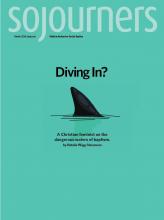These weeks are the high point of the Christian year. They are also taxing for those who are preachers. The Sundays seem to come around every few minutes, while liturgies fly at you even faster during Holy Week. All the more important, then, to dine on the Word ourselves, before we feed others from what we’re cooking. Thankfully, the church has set aside the richest texts we have to describe the mystery that is beyond describing—that God is in Christ reconciling the entire world. Often we can’t even reconcile—piece together—our own lives! Let alone our families, churches, communities. Thankfully, we don’t have to. God already has. Our work is announcing what’s been completed and enjoying its fruits.
The liturgies of Lent, the Passion, and Holy Week are what seep deep into people’s bones. Our words bring to light what God is already doing. Make use of these. Have worship on Wednesday to wash feet and on Maundy Thursday to join in Jesus’ inauguration of the Lord’s Supper. Do like the African-American church has done and invite people to gather for three hours on Good Friday to hear seven sermons. Gather like the Orthodox and the Catholics at dawn on Easter, light a fire, and have folks process into church carrying the light of Christ and singing. It’s a week of revival, as evangelicals put it. God isn’t just resurrecting Jesus. God’s stitching the church back together—and the universe too.
[March 6]
Dereliction and Duty
Joshua 5:9-12; Psalm 32; 2 Corinthians 5:16-21; Luke 15:1-3, 11b-32
You could live with each of these texts every moment left in your life and never exhaust them. They have an accent on forgiveness, grace, and celebration. This is already odd in Lent—a season in which, traditionally, we train ourselves not to say “hallelujah” so that it will ring out all the sweeter on Easter when our lips curl around its contours for the first time in weeks. Israel’s disgrace is “rolled away,” as the word “Gilgal” announces (Joshua 5:9). Happy are we when our “sin is covered” (Psalm 32:1), when God is our hiding place. And Christ is reconciling every atom in the universe—and more miraculously still—entrusting us (us!) with God’s ministry of reconciliation (2 Corinthians 5).
Luke 15 is more staggering still. It is often misnamed “the prodigal son.” But as Tim Keller and others have pointed out, it is the father who is most extravagant here. The father, as if he dies to himself, gives the younger son his inheritance. Then, when the younger son returns, the father celebrates with what is left (presumably cutting into the elder’s share). The younger son’s depth of dissolution would have drawn a reflexive shudder from the story’s first readers (Pigs! Akin to, say, roaches for us). And the elder son is just as lost as the younger—he just has a better strategy for getting the father’s stuff by dutifully waiting for dad’s death. Better, that is, until he runs headlong into his father’s rule-transcending generosity.
Read the Full Article

